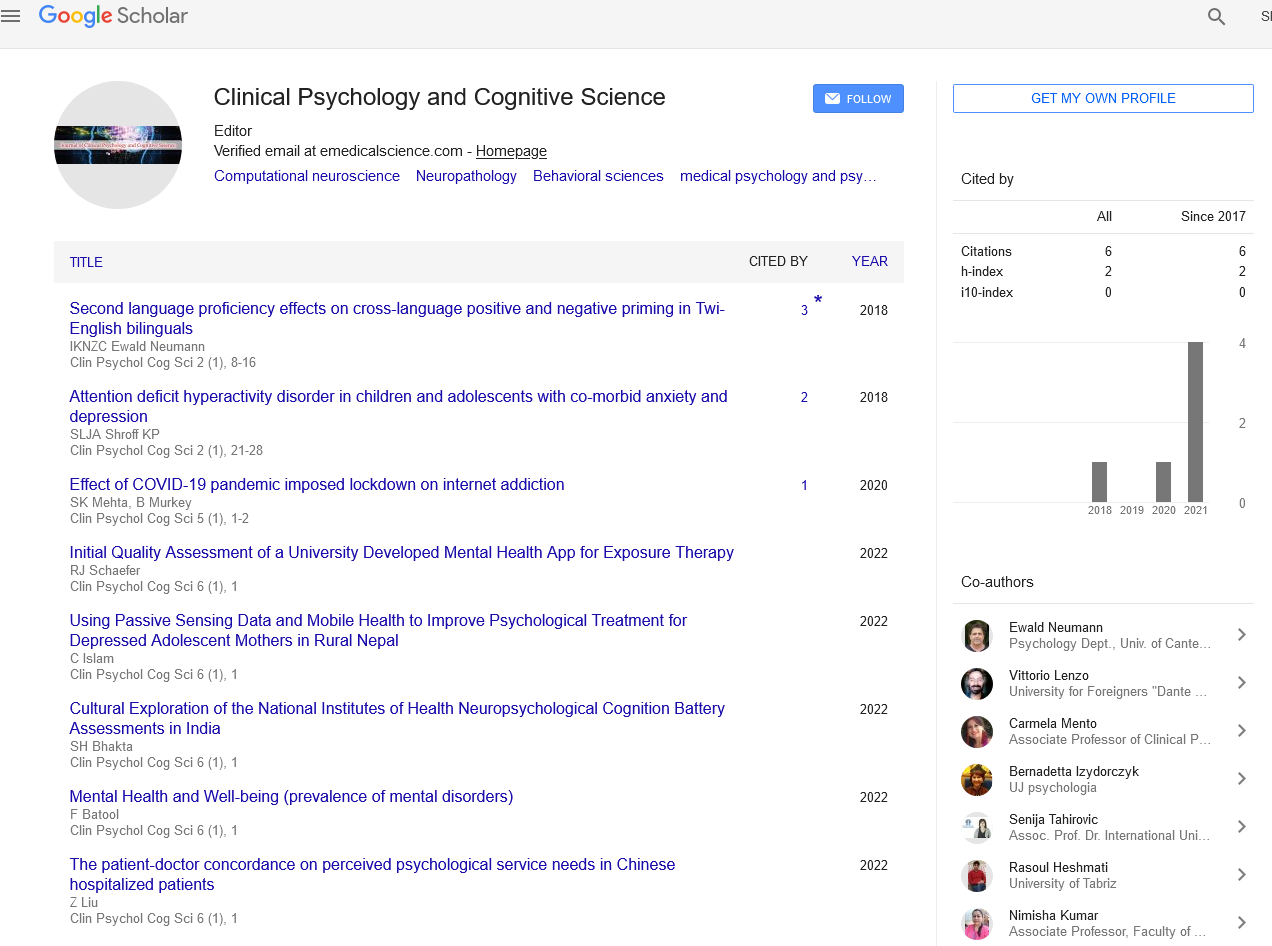Difference between rehabilitation psychologist and clinical psychologist
Received: 06-Sep-2021 Accepted Date: Sep 20, 2021; Published: 27-Sep-2021
Citation: Elliott D. Difference between rehabilitation psychologist and clinical psychologist.Clin Psychol Cog Sci. 2021;5(2):3.
This open-access article is distributed under the terms of the Creative Commons Attribution Non-Commercial License (CC BY-NC) (http://creativecommons.org/licenses/by-nc/4.0/), which permits reuse, distribution and reproduction of the article, provided that the original work is properly cited and the reuse is restricted to noncommercial purposes. For commercial reuse, contact reprints@pulsus.com
Abstract
Clinical psychology is a psychology specialty that provides continuous and comprehensive psychological and behavioral health care for individuals and families. Provide advice to institutions and communities; training, education, and supervision; and research-based practices. It is a wide-ranging profession, including severe psychopathology, and it is characterized by the completeness and integration of knowledge and skills from a wide range of disciplines within and outside the actual psychology. The scope of clinical psychology covers all age groups, diversity and different systems. Clinical psychologists apply knowledge and methods in all important fields of bio-psychosocial science to promote and maintain personal mental health. Due to changes in lifestyles, habits, and increased personal/professional/social pressure, mental health problems in different areas of society are increasing. As a major, clinical psychology provides services to individuals and families from all ethnic, cultural, and socio-economic backgrounds, groups, and communities.
Description
Clinical psychologist
Clinical psychology is a psychology specialty that provides continuous and comprehensive psychological and behavioral health care for individuals and families. Provide advice to institutions and communities; training, education, and supervision; and research-based practices.
It is a wide-ranging profession, including severe psychopathology, and it is characterized by the completeness and integration of knowledge and skills from a wide range of disciplines within and outside the actual psychology. The scope of clinical psychology covers all age groups, diversity and different systems. Clinical psychologists apply knowledge and methods in all important fields of bio-psychosocial science to promote and maintain personal mental health. Due to changes in lifestyles, habits, and increased personal/professional/social pressure, mental health problems in different areas of society are increasing. As a major, clinical psychology provides services to individuals and families from all ethnic, cultural, and socio-economic backgrounds, groups, and communities.
Clinical psychologists work in a variety of environments, including hospitals, clinics, companies, and private offices. Some people specialize in working with people with mental or physical problems, prison inmates, drug and alcohol abusers, or elderly patients. In some cases, clinical psychologists work with psychiatrists and social workers to conduct team research. Clinical psychologists also provide services for courts to evaluate defendants or potential probation officers, while others are used by the armed forces to evaluate or treat service personnel.
Clinical psychologist is expected to perform the following functions:
• Diagnose mental health problems.
• Design specific mental health problems for adults and children in a psychological framework that appropriately considers psychosocial/ situational factors, and conduct appropriate treatment/treatment.
• Apply psychological principles and techniques to the rehabilitation of people with mental health problems and disabilities.
• Deal with the psychosocial aspects of physical diseases, formulate and implement key/targeted psychosocial interventions.
• Work with the community to promote health, quality of life and mental health.
• Research in the field of psychotherapy, such as mental health/illness, physical health/illness and related social issues, such as misunderstanding, stigma, discrimination, social tension, gender construction, lifestyle, etc.
• Undertake administrative and supervisory/decision-making tasks in the field of mental health.





